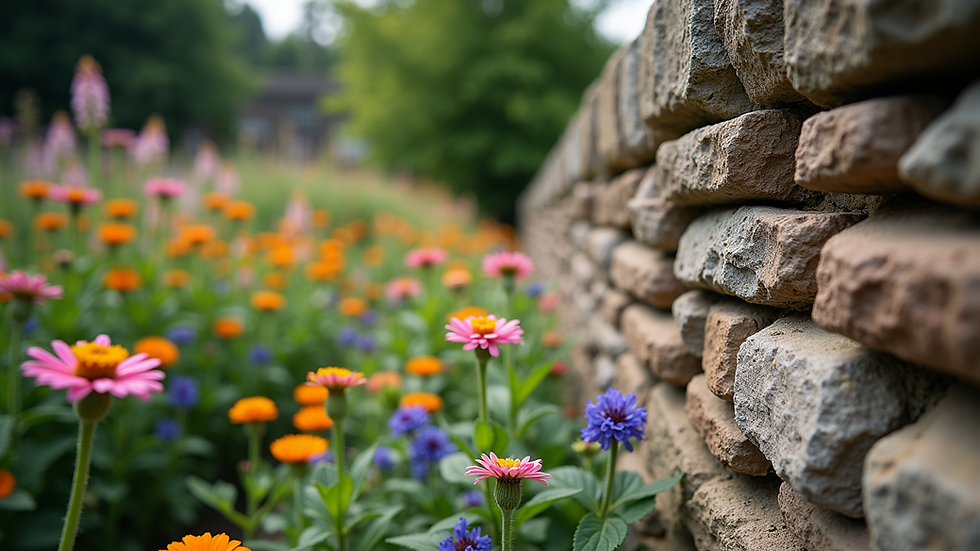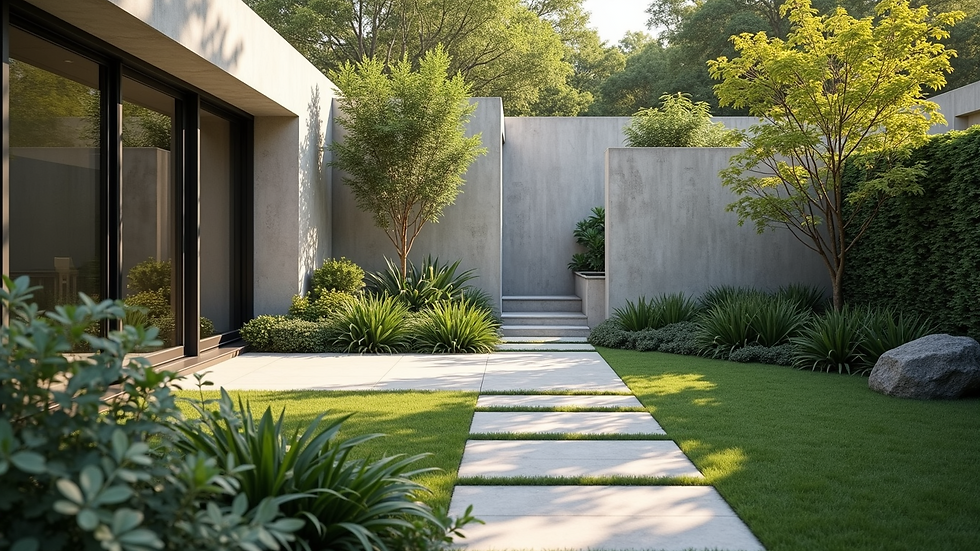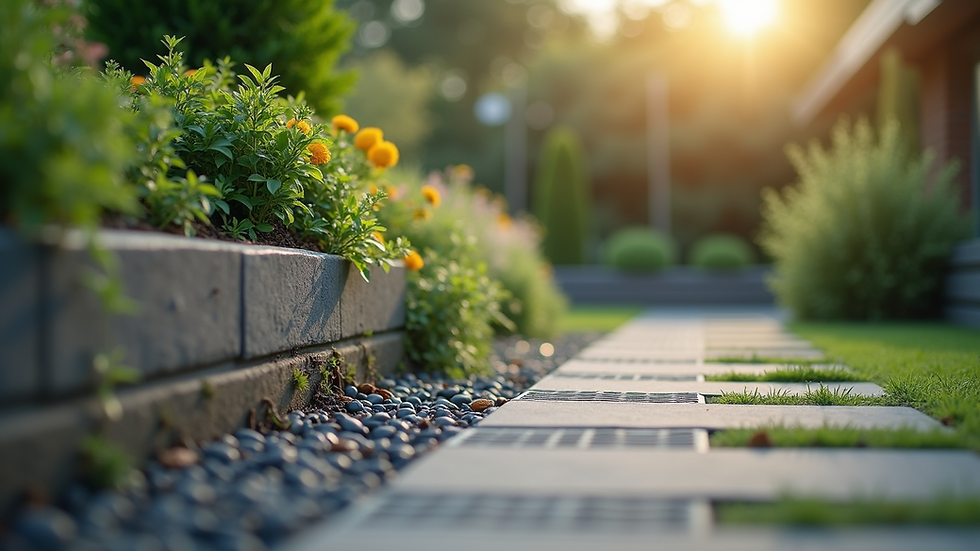Understanding the Purpose and Benefits of Garden Wall Structures
- Monarch Masonry Team

- May 24, 2025
- 4 min read
Garden walls play a vital role in enhancing the aesthetics and functionality of outdoor spaces. These structures can serve several purposes, from providing privacy and security to improving the organization of your garden. In this blog post, we will explore the benefits and applications of garden wall structures and how they can transform your landscape.
What Are Garden Walls?
Garden walls are vertical structures built specifically for landscaping and gardening purposes. They can be made from various materials such as stone, brick, concrete, or wood. Depending on their design and purpose, garden walls can be low and decorative or high and functional, forming barriers or enclosures.
These walls are often used to define spaces within the garden, creating areas for plant beds, seating, or other features. They can also help control soil erosion and provide support for plants, ensuring a more organized and visually appealing landscape.

Benefits of Garden Walls
Enhancing Aesthetic Appeal
One of the most significant advantages of constructing garden walls is the aesthetic appeal they bring to your outdoor space. A well-designed wall can serve as a focal point within the garden, drawing the eye and creating interesting visual contrasts. For instance, a rustic stone wall can add character to a modern garden while softening its lines.
You can also paint wooden walls or use unique materials to match your home's architectural style, making your garden more cohesive and visually appealing.

Creating Privacy and Protection
Garden walls can provide you with much-needed privacy in your backyard. By building a wall, you can create a secluded area where you can enjoy your garden without the prying eyes of neighbors. This privacy can be further enhanced by planting climbing plants or adding decorative features.
Additionally, garden walls can serve as a barrier against harsh weather conditions. For instance, walls can deflect wind, protect delicate plants, and retain heat, creating a more favorable microclimate for your garden.
Improving Soil and Water Management
Proper drainage is crucial in any garden. Walls and structures can aid in water management, especially if you have sloped terrain. By directing water flow, garden walls can help prevent soil erosion and ensure moisture levels are maintained.
Does a 2 foot retaining wall need drainage? Yes, it does! Even a 2-foot retaining wall should be designed with drainage in mind. Without proper drainage, water can build up behind the wall, leading to possible structural failure and soil erosion. It’s essential to incorporate drainage solutions like weep holes or gravel backfill to extend the life of your garden wall.

Defining Spaces
Garden walls can help in defining various space segments in your garden. Whether you want to separate your vegetable patch from ornamental plants or create different zones for relaxation and entertainment, garden walls are an excellent choice. These structures serve both as physical barriers and visual dividers, helping you create a well-organized landscape.
Providing Structural Support
In addition to their aesthetic and functional benefits, garden walls can provide structural support to your plants. "Retaining walls" can support soil in hilly or uneven areas, keeping your garden layout intact. This added support allows you to design elevated garden beds while retaining soil, making it easier to grow different types of plants in optimal conditions.
Choosing the Right Material
When it comes to garden walls, the choice of materials can significantly influence functionality and aesthetics. Here are some popular choices:
Stone Walls
Stone walls are timeless and offer durability and natural beauty. They can be built using various types of stones, including granite and limestone, giving you numerous design options. A stone wall can blend beautifully with natural surroundings and add rustic charm to your garden.
Brick Walls
Brick is another popular choice for garden walls. It provides a classic look and can be painted or left in its natural color. Brick walls are sturdy and can support various plantings, making them perfect for both decorative and functional applications.
Wood Walls
Wooden garden walls offer warmth and a natural feel. They are usually easier and quicker to construct than stone or brick walls, making them an excellent choice for DIY enthusiasts. However, be mindful of the type of wood you choose; some may require treatments to resist decay.
Installation and Maintenance Tips
Building a garden wall requires planning and execution to ensure it serves your intended purpose effectively. Here are some tips for installation and maintenance:
Planning Your Garden Wall
Before constructing a garden wall, consider the following:
Purpose: Define the goal of your wall. Is it for privacy, aesthetics, or support?
Size and Location: Measure the area and decide on the height and length of the wall. Make sure to consider local regulations regarding wall heights.
Design: Sketch your ideas. Integrate your wall design with other garden features.
Installation
Foundation: A solid foundation is crucial for stability. Dig a trench and use compacted gravel to create a level base.
Material Arrangement: Start laying your chosen materials from one end to the other, ensuring alignment.
Drainage: Don’t forget to include drainage solutions to prevent water buildup.
Maintenance
Regular Inspections: Periodically check for cracks or shifts in the wall.
Cleaning: Remove dirt and algae buildup to maintain aesthetics.
Repairs: Address any damage promptly to prolong the wall’s lifespan.
Final Thoughts
Garden walls serve many purposes, from enhancing your outdoor space's beauty to providing much-needed privacy and support. Implementing these structures can transform any garden into a more functional and serene environment. Whether you choose stone, brick, or wood, the right garden wall can elevate your landscape to new heights.
With careful planning and consideration, you can create a stunning garden wall that meets your needs and aligns with your vision. Happy gardening!
Ready to Get Started?
Let’s build something solid. Contact Monarch Masonry today for a free estimate or consultation.
📞 +1 (416) 649-6419



Comments